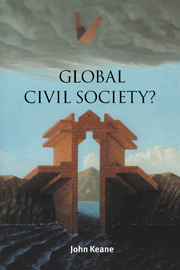Cosmocracy
Published online by Cambridge University Press: 14 January 2010
Summary
A court society?
Although turbocapitalism is arguably the force that most strongly energises the non-governmental sector from within, global civil society is not simply its child. To repeat: global civil society is overdetermined by various forces. It is a ‘syndrome’ of processes and activities which have multiple origins and multiple dynamics, some of them (like the recent collapse and discrediting of communism) more conjunctural than deep-seated. Together, these forces ensure that global civil society is not a single, unified domain, and that it will not be turned into something that resembles a combined factory, warehouse and shopping mall retailing consumer products on a global scale – let's say, a version of Disney's ‘Its a Small World After All’ or Naomi Klein's ‘international rule of the brands’. Global civil society is not simply reducible to the logic of commodity production and exchange, which helps to explain both its semantic promiscuity and its normative appeal to an astonishing variety of conflicting social interests, ranging from groups clustered around the World Bank to broad-minded Muslims defending their faith and radical ecological groups pressing for sustainable development.
If the institutions of global civil society are not merely the products of civic initiatives and market forces then is there a third force at work in nurturing and shaping it? It can be argued that global civil society is also the by-product of governmental or intergovernmental action or inaction.
- Type
- Chapter
- Information
- Global Civil Society? , pp. 92 - 128Publisher: Cambridge University PressPrint publication year: 2003

